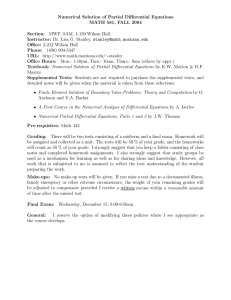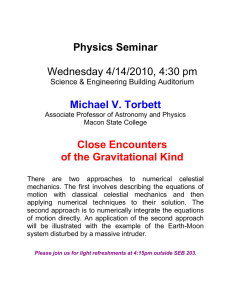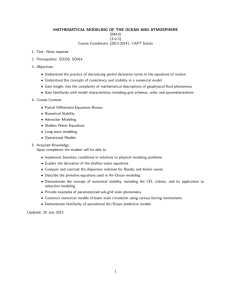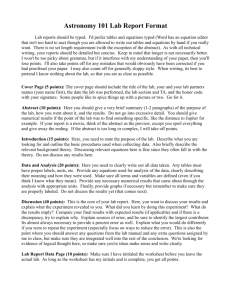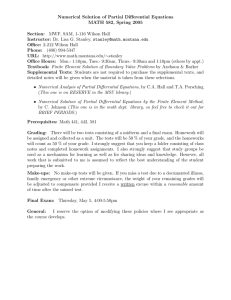3603 (Numerical Methods)
advertisement
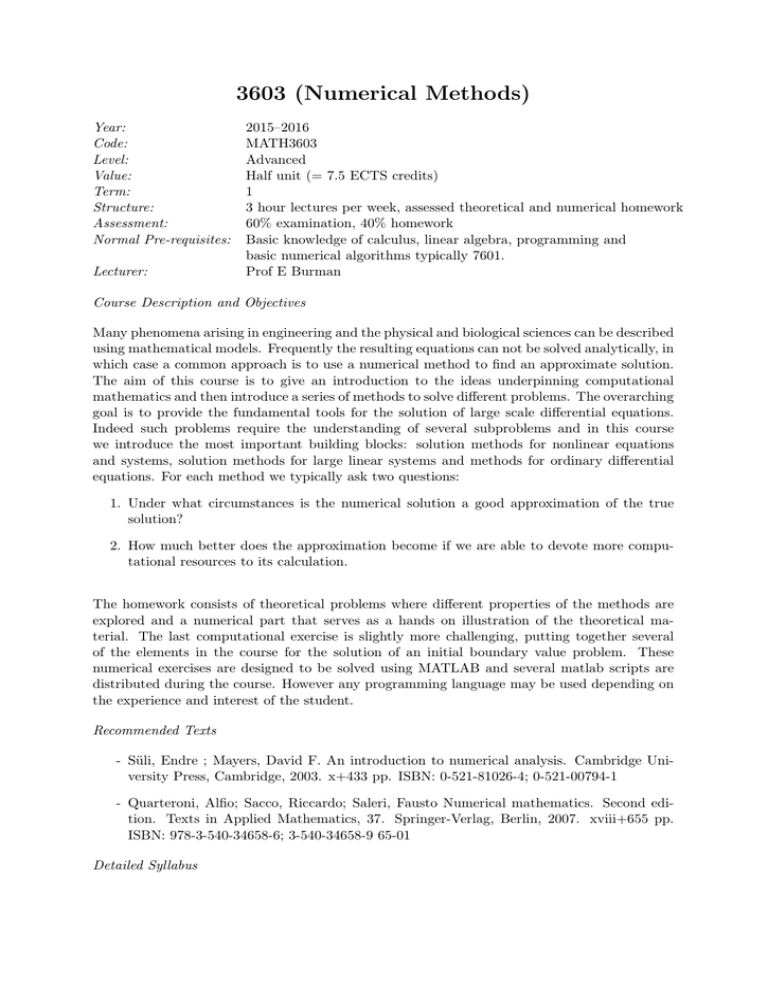
3603 (Numerical Methods) Year: Code: Level: Value: Term: Structure: Assessment: Normal Pre-requisites: Lecturer: 2015–2016 MATH3603 Advanced Half unit (= 7.5 ECTS credits) 1 3 hour lectures per week, assessed theoretical and numerical homework 60% examination, 40% homework Basic knowledge of calculus, linear algebra, programming and basic numerical algorithms typically 7601. Prof E Burman Course Description and Objectives Many phenomena arising in engineering and the physical and biological sciences can be described using mathematical models. Frequently the resulting equations can not be solved analytically, in which case a common approach is to use a numerical method to find an approximate solution. The aim of this course is to give an introduction to the ideas underpinning computational mathematics and then introduce a series of methods to solve different problems. The overarching goal is to provide the fundamental tools for the solution of large scale differential equations. Indeed such problems require the understanding of several subproblems and in this course we introduce the most important building blocks: solution methods for nonlinear equations and systems, solution methods for large linear systems and methods for ordinary differential equations. For each method we typically ask two questions: 1. Under what circumstances is the numerical solution a good approximation of the true solution? 2. How much better does the approximation become if we are able to devote more computational resources to its calculation. The homework consists of theoretical problems where different properties of the methods are explored and a numerical part that serves as a hands on illustration of the theoretical material. The last computational exercise is slightly more challenging, putting together several of the elements in the course for the solution of an initial boundary value problem. These numerical exercises are designed to be solved using MATLAB and several matlab scripts are distributed during the course. However any programming language may be used depending on the experience and interest of the student. Recommended Texts - Süli, Endre ; Mayers, David F. An introduction to numerical analysis. Cambridge University Press, Cambridge, 2003. x+433 pp. ISBN: 0-521-81026-4; 0-521-00794-1 - Quarteroni, Alfio; Sacco, Riccardo; Saleri, Fausto Numerical mathematics. Second edition. Texts in Applied Mathematics, 37. Springer-Verlag, Berlin, 2007. xviii+655 pp. ISBN: 978-3-540-34658-6; 3-540-34658-9 65-01 Detailed Syllabus • Theoretical foundations of computational mathematics: conditioning, stability, consistency, numerical stability, convergence, the equivalence theorem. • Numerical solution of nonlinear equations: the bisection algorithm, fixed point iteration, Newton’s method and its relatives. • Numerical solution of large linear systems: iterative methods, Gauss’/Jacobi’s methods, Richards’ method and the gradient method, preconditioning, the conjugate gradient method. • Methods for ordinary differential equations: the Cauchy problem, the basic single step methods, explicit and implicit methods, zero-stability and absolute stability, truncation error, convergence, extensions to system of equations. Introduction to the discretisation of boundary value problems. May 2015 MATH3603
